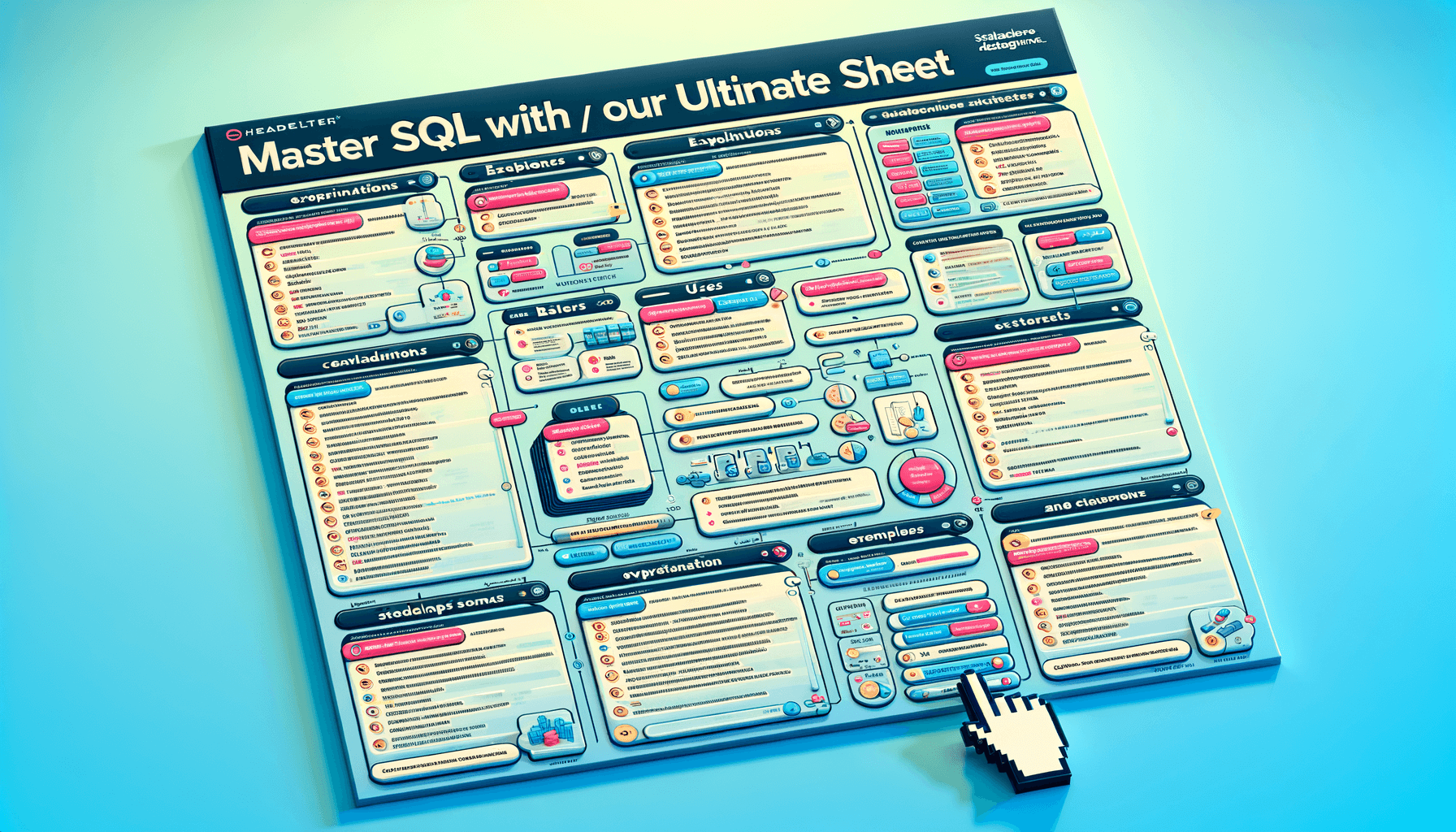A big variety of articles and resources

Mastering Data Management: The Ultimate Course to Learn SQL
 Sia Author and Instructor
Learn SQL
Sia Author and Instructor
Learn SQL
8 minute read
Understanding SQL and Its Importance
Structured Query Language (SQL) is the cornerstone of effective data management and analysis in today's data-driven world. This section embarks on a journey through the fundamental aspects of SQL, elucidating its pivotal role for data scientists. With SQL's standardized commands, you can retrieve, update, insert, and delete database records, making it an indispensable tool for anyone looking to make data-informed decisions.
Getting Started with SQL Basics
Setting Up Your SQL Environment
Before diving into SQL, it's crucial to set up your environment properly. This involves installing a database server like PostgreSQL or MySQL. Learning SQL is less straightforward than languages like Python simply because of the setup required to run SQL queries. For example, unless you're fortunate enough to have access to a fully set up database already, you first need to install and run a Postgres server, initialize some tables, and insert data to start learning how to query a Postgres instance.
Basic SQL Commands
Once your environment is set up, you can start learning basic SQL commands. These commands include SELECT, INSERT, UPDATE, and DELETE. Courses like 'SQL for Newbs: Data Analysis for Beginners' lay down the foundations, focusing on basic syntax and queries. Practical applications might include setting up simple databases for small businesses or understanding data flow within existing systems.
Hands-On Exercises for Beginners
Practical experience is key to mastering SQL. Engage in hands-on exercises to solidify your understanding. Not sure where to start? Take an Assessment or browse SQL courses and tracks. For beginners, introductory courses can teach you how to create and query relational databases using SQL in just two hours. Accompanied at every step with hands-on practice queries, these courses teach you everything you need to know to analyze data using your own SQL code today!
Setting up your SQL environment correctly is the first step towards mastering SQL. Make sure to follow the instructions carefully to avoid any issues later on.
Intermediate SQL Techniques
Joins and Subqueries
Joins and subqueries are essential for combining data from multiple tables. Mastering these techniques allows you to perform advanced SQL operations, such as subqueries and joins, which are crucial for complex data retrieval tasks. There are different types of joins, including Inner, Left, Right, and Full Joins, each serving a unique purpose in data management.
Working with Indexes
Indexes are used to speed up the retrieval of rows by using a pointer. They are essential for improving the performance of SQL queries. Understanding how to create and use indexes effectively can significantly enhance your database's performance. Proper indexing can make a huge difference in query execution time, especially in large databases.
Optimizing SQL Queries
Optimizing SQL queries involves writing efficient and optimized SQL queries for improved performance. This includes using techniques like query refactoring, indexing, and analyzing query execution plans. The goal is to reduce the time and resources required to execute queries, making your database operations more efficient.
In this mini course: sql query crafting. learn sql for data analysis and marketing. master complex queries, improve data retrieval, and advance career with real-world applications.
Advanced SQL for Data Analysis
Complex Queries and Functions
Advanced learners can challenge themselves with courses like Advanced SQL for Data Scientists, which covers sophisticated techniques in data manipulation and analysis. Each course is designed with practical applications in mind, such as handling real-world datasets and solving business problems through SQL queries. Examples include analyzing sales data to identify trends or optimizing database design for faster query execution. This hands-on approach ensures that learners not only grasp SQL syntax but also understand its practical applications.
Data Aggregation and Grouping
Data Aggregation provides robust tools for summarizing data, such as GROUP BY and SUM(), enabling analysts to derive meaningful patterns and trends. For instance, to calculate the total sales by category, one might use:
SELECT category, SUM(sales) FROM products GROUP BY category;
Using SQL for Business Intelligence
SQL is a powerful tool for business intelligence, allowing analysts to perform advanced analytics and derive insights from data. Beyond basic queries, SQL supports complex analytical operations like JOINs, which are crucial for combining data from multiple sources. This capability is essential for creating comprehensive reports and dashboards that inform business decisions. Practical skills enhancement is included in many advanced SQL courses, ensuring that learners can apply their knowledge in real-world scenarios.
Mastering advanced SQL techniques can give you a competitive edge in the field of business intelligence, enabling you to handle complex datasets and perform in-depth analyses.
Real-World SQL Applications
Case Studies and Examples
SQL is extensively used across various industries to solve real-world problems. For instance, in the finance sector, SQL helps in managing and analyzing large datasets to detect fraudulent activities. In healthcare, it aids in maintaining patient records and improving the quality of care. Efficient data preparation and advanced analytical skills are crucial for these applications.
SQL in Big Data Projects
In the realm of big data, SQL plays a pivotal role. It is used to query massive datasets stored in distributed systems like Hadoop and Spark. This enables businesses to generate insights and reports using SQL, which are essential for making data-driven decisions. The ability to perform efficient and performant SQL queries using best practices is highly valued in big data projects.
Practical Tips and Best Practices
To excel in SQL, one must follow best practices and practical tips. This includes understanding how SQL queries are processed behind the scenes, which helps in writing more creative and efficient code. Additionally, database best practices such as sharding and replication are essential for scaling databases. These techniques ensure that your data is always available and can handle high traffic loads.
Learn to perform efficient and performant SQL queries using best practices. This skill is essential for roles such as SQL Developer, Database Administrator, and Business Analyst.
SQL Security and Best Practices
Handling User Authentication
Ensuring proper user authentication is crucial for database security. Implementing multi-factor authentication (MFA) can significantly enhance security by requiring users to provide two or more verification factors. Additionally, always use strong, unique passwords and regularly update them to prevent unauthorized access.
Data Encryption Techniques
Data encryption is essential for protecting sensitive information. Encrypt data both at rest and in transit to safeguard it from unauthorized access. Use industry-standard encryption algorithms and keep your encryption keys secure. Encrypting sensitive data helps in maintaining confidentiality and integrity.
Ensuring Data Integrity
Maintaining data integrity involves ensuring that data is accurate, consistent, and reliable. Implementing constraints, such as primary keys and foreign keys, can help maintain data integrity. Regularly back up your data and use checksums to detect any corruption. Additionally, consider using database normalization techniques to reduce redundancy and improve data integrity.
Secure your databases by following best practices and regularly updating your security protocols. This will help protect your data from potential threats and vulnerabilities.
Ensuring SQL security is crucial for protecting your data and maintaining the integrity of your database systems. By following best practices, you can safeguard against potential threats and vulnerabilities. To dive deeper into SQL security and enhance your skills, visit our website and explore our comprehensive courses. Our expert-led modules, supported by AI, will help you master SQL and other advanced technologies.
Conclusion
Unlock the power of data with SQL mastery! Whether you're a beginner eager to build a strong foundation or an experienced professional looking to fine-tune your expertise, mastering SQL is an invaluable skill in today's data-driven world. This comprehensive guide has covered everything from the basics to advanced topics, ensuring you have the knowledge and hands-on experience needed to excel. With practical examples, real-world scenarios, and a hands-on approach, you'll be well-equipped to tackle any data management challenge. So, dive in, practice diligently, and watch as your SQL skills transform your ability to manage and analyze data efficiently. Happy learning!
Frequently Asked Questions
What is SQL and why is it important?
SQL (Structured Query Language) is a standardized language used to manage and manipulate databases. It is important because it allows users to efficiently retrieve, update, and manage data, making it essential for data analysis, business intelligence, and various applications across industries.
Who should enroll in this SQL course?
This course is ideal for beginners who want to build a strong foundation in SQL, as well as experienced professionals looking to fine-tune their expertise. Data science enthusiasts, business analysts, and anyone interested in mastering data management will benefit from this course.
What will I learn in the SQL Ultimate Course?
In the SQL Ultimate Course, you will learn everything from SQL basics to advanced topics. The course covers setting up your SQL environment, basic and intermediate SQL commands, complex queries, data aggregation, business intelligence applications, and SQL security best practices.
Are there hands-on exercises included in the course?
Yes, the course includes tons of hands-on exercises to practice what you learn and test your knowledge. These exercises are designed to simulate real-world scenarios, helping you apply SQL concepts effectively.
Is this course suitable for advanced learners?
Absolutely! Advanced learners can challenge themselves with topics like advanced SQL querying techniques, optimization, performance tuning, and real-world case studies. The course is designed to cater to all levels of expertise.
How is this course structured?
The course is structured into 24 carefully crafted modules, progressing from SQL basics to advanced topics. Each module provides practical knowledge and hands-on experience, ensuring a comprehensive understanding of SQL.





